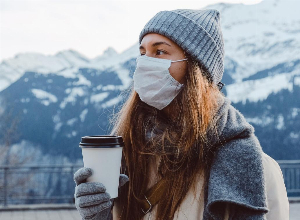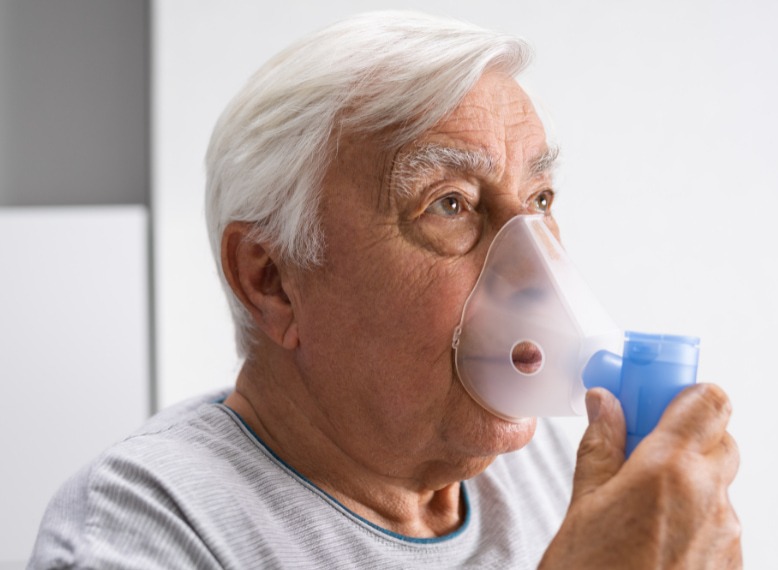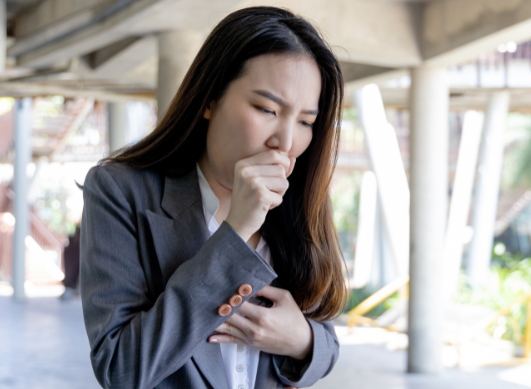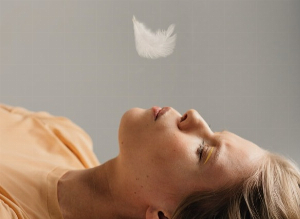Everything you need to know about COPD and the Coronavirus!
Published Apr 7, 2020 • Updated Apr 15, 2020 • By Camille Dauvergne
Chronic obstructive pulmonary disease (or COPD) is a serious chronic inflammatory disease of the bronchi that affects nearly 16 million people across the US. In many cases, it is caused by smoking (or second-hand smoke).
Because COPD affects the lower airways, and because patients present on average 5 comorbidities (metabolic, muscular, cardiac, gastrointestinal, psychological, etc.), the risk of developing a serious form of COVID-19, which can manifest itselfs as severe acute respiratory failure, is higher for these patients than for the general population.
Philippe Poncet, President of the French COPD association 'France BPCO', allowed us to answer patients' questions! As he himself suffers from COPD, he is committed to defending the protection rights of these patients in the current public health situation.
Why is the risk of complications higher for COPD patients? How can you protect yourself? What about treatments? We explain everything!

I have COPD, do I need to follow specific protective measures?
Of course, you should start by correctly following the general recommendations et strictly comply with the social distancing measures and barrier gestures.
Outings should be limited as much as possible and the following practices should be encouraged: teleconsultations, home delivery, working from home, etc. In the case that teleworking is not possible, the Families First Coronavirus Response Act (FFCRA or Act) requires certain employers to provide their employees with paid sick leave and expanded family and medical leave if the employee is unable to work (including telework) under certain circumstances. You can find more information here. Additionally, the Employment and Training Administration announced new flexibility to states' administration of unemployment insurance programs in circumstances related to COVID-19. You can check your state's unemployment insurance program here and discover the procedure for filing here.
In view of the current mask shortage, masks should be reserved, as a priority, to healthcare workers and other medical first responders. The CDC recommends wearing cloth face coverings in public settings where other social distancing measures are difficult to maintain (e.g., grocery stores and pharmacies), especially in areas of significant community-based transmission. Masks or face coverings should help to slow the spread of the virus and help people who may have the virus and do not know it from transmitting it to others. Cloth face coverings should not be placed on young children under age 2, anyone who has trouble breathing, or is unconscious, incapacitated or otherwise unable to remove the mask without assistance. It is therefore not recommended to wear a mask or cloth face covering if you have having difficulty breathing.
Can I continue my physiotherapy during self-isolation?
Wherever possible, your essential COPD physiotherapy should continue, to avoid developing complications related to your chronic condition. The CDC, however, is asking everyone to access medical help remotely rather than in person, if they can. Talk to your doctor or physical therapist to see what is the best solution for you. Make sure that you utilise the barrier gestures if you do visit your physiotherapist!
The British Lung Foundation in the UK recommends staying physically active to help cope with social distancing and has created a series of exercise videos that can be done from home.
I'm a smoker, or former smoker, am I more at risk?
Smoking causes damages to your lungs, putting you at more risk of serious complications. According to the CDC, smoking is a serious risk factor, as people who smoke are more likely to get sick and are more susceptible to lung infections. Smoking can also lead to coughing, which can lead to the transmission of the coronavirus to those around you, especially in the case of an asymptomatic infection (infection without symptoms). For more information on the risks of infection and severe forms of COVID-19, see the World Health Organization's page on tabacco use and COVID-19.
According to Philippe Poncet, nearly 3 million French people, many of whom are smokers, are unaware that they suffer from COPD. In the US, it is estimated that up to 12 million people are living undiagnosed. These people are all the more at risk because their condition has not been stabilized.
In the case of COPD, former smokers or non-smokers are just as much at risk.
I'm on corticosteroids, should I stop my medication to avoid complications?
According to Philippe Poncet, treatment with inhaled and/or oral corticosteroids should in no case be interrupted without the advice of the pulmonologist or the treating physician, at the risk of worsening COPD without reducing the risk of coronavirus infection and complications.
It is important to differentiate between non-steroidal anti-inflammatory drugs (NSAIDs) such as ibuprofen, voltaren, which scientists in other countries, such as France, believe may lower your immune defences and therefore promote a serious form of COVID-19, and corticosteroids such as cortisone. This is a steroidal anti-inflammatory drug, which should not be stopped if you are taking it as part of your treatment.
If you have any questions about your treatments, corticosteroids or other medications, it is recommended that you contact your doctor by telephone or tele-consultation.
I'm on oxygen therapy, is there a risk of shortages due to to the COVID-19 pandemic?
Mr. Poncet confirms that at present, "all the necessary measures have been taken to ensure the safety of each patient and that necessary reserves are in place to avoid any break in the chain of care, including the supply of liquid oxygen, which could possibly be replaced over time by oxygen generators during the crisis. Patient organizations are committed to communicating with their patients in order to provide the best possible support during the epidemic."
How can COPD symptoms be differentiated from those of COVID-19? What should I do if I have symptoms (cough, fever, difficulty breathing, etc.)?
The first symptom that should warn you is fever! If it is accompanied by shortness of breath that is significantly worse than usual and a dry cough, it may be COVID-19. You may also experience specific symptoms such as aches and pains or a sudden loss of smell (and taste).
How do I measure the progress of my shortness of breath? According to Poncet, "you have to take your time, check your device and the difference between your activities that day and the day before to try to gauge the difference. An oximeter can be useful here."
An isolated dry cough is not sufficient to suggest COVID-19. However, sudden shortness of breath or usual exaggerated symptoms associated with fever are reasons to call for emergency medical attention.
In the case of all three symtoms: sudden dry cough + fever + differentiated shortness of breath, call your doctor or 911 immediately. Make sure to inform the operator that you believe you may have the coronavirus.
As a rule, in the event of suggestive symptoms: do not go to the ER or to your doctor's!
The CDC has set up an online tool to help patients describe their symptoms in a concise manner and make decisions about seeking proper medical care. You can access the Coronavirus self-checker here by clicking "Self-Check" at the top of the page.
I have emphysema, is that an added danger?
According to Professor James Chalmers, an infectious disease expert from the European Respiratory Society (ERS) and Professor Leo Heunks, an intensive care specialist, patients with emphysema are among those considered to be at higher risk of complications from COVID-19. This is because emphysema is a destruction of the lung which, in some cases, can lead to respiratory failure when it is advanced. If you have respiratory failure, then in this case there is an additional risk of infection. But if you have emphysema without respiratory failure then there is no additional risk compared to COPD without emphysema.
I'm living with a relative with COVID-19, how can I protect myself?
In this case, you should:
- Stay at home and isolate yourself from the infected person (if possible in separate rooms)
- Implement the barrier gestures
- Monitor your temperature twice a day and watch for the aforementioned symptoms.
Are there any respiratory after-effects after a recovery from COVID-19?
Patients who have had acute respiratory distress syndrome in ICU may have long-term after-effects, such as microscopic damage to the lungs. These deteriorations may decrease lung function and thus increase shortness of breath.
According to Philippe Poncet, "the after-effects of COVID-19 could lead to a massive influx of new COPD patients."
However, most cases of COVID-19 are benign, and although there is still little evidence of the consequences of the infection, these patients are unlikely to experience any after-effects. This data will become better known in the coming months.
How can I keep up-to-date with COPD news?
- The American Lung Association: The ALA is the leading American organization working to save lives by improving lung health and prevent lung disease through education, advocacy, and research.
- The COPD Foundation: Founded in 2004, the COPD Foundation is a not-for-profit organization established to speed innovations which will make treatment more effective and affordable, to undertake initiatives that result in expanded services for COPD patients, and improve the lives of patients with COPD and related disorders (through scientific research, education & awareness) that will lead to prevention and a stop in the progression of COPD.
- The CHEST Foundation: The CHEST Foundation's mission is to champion lung health by supporting clinical research, community service, and patient education.
- The British Lung Foundation: Though it may be across the pond, the BLF can be a good resource for information relating to COPD. The BLF aims to prevent lung disease by campaigning for positive change in the UK's lung health and by raising awareness about lung disease, the dangers that cause it, and how to look after your lungs.
Was this article useful to you? Do you have any other tips to share with the community?
Take care and stay home!
https://www.inserm.fr/information-en-sante/dossiers-information/bronchopneumopathie-chronique-obstructive-bpco
https://www.santepubliquefrance.fr/maladies-et-traumatismes/maladies-et-infections-respiratoires/bpco-et-insuffisance-respiratoire-chronique/notre-action/#tabs
https://sante-respiratoire.com/covid19-point-dinformation/#Les_comportements_a_adopter
https://sante-respiratoire.com/travail-revenus-les-mesures-prises-dans-le-cadre-de-lepidemie-du-coronavirus/
https://www.lung.org/
https://foundation.chestnet.org/
1 comment

You will also like

COPD: understanding the effects of cold weather on the disease and avoiding exacerbations
Nov 20, 2023 • 1 comment

 Facebook
Facebook Twitter
Twitter

